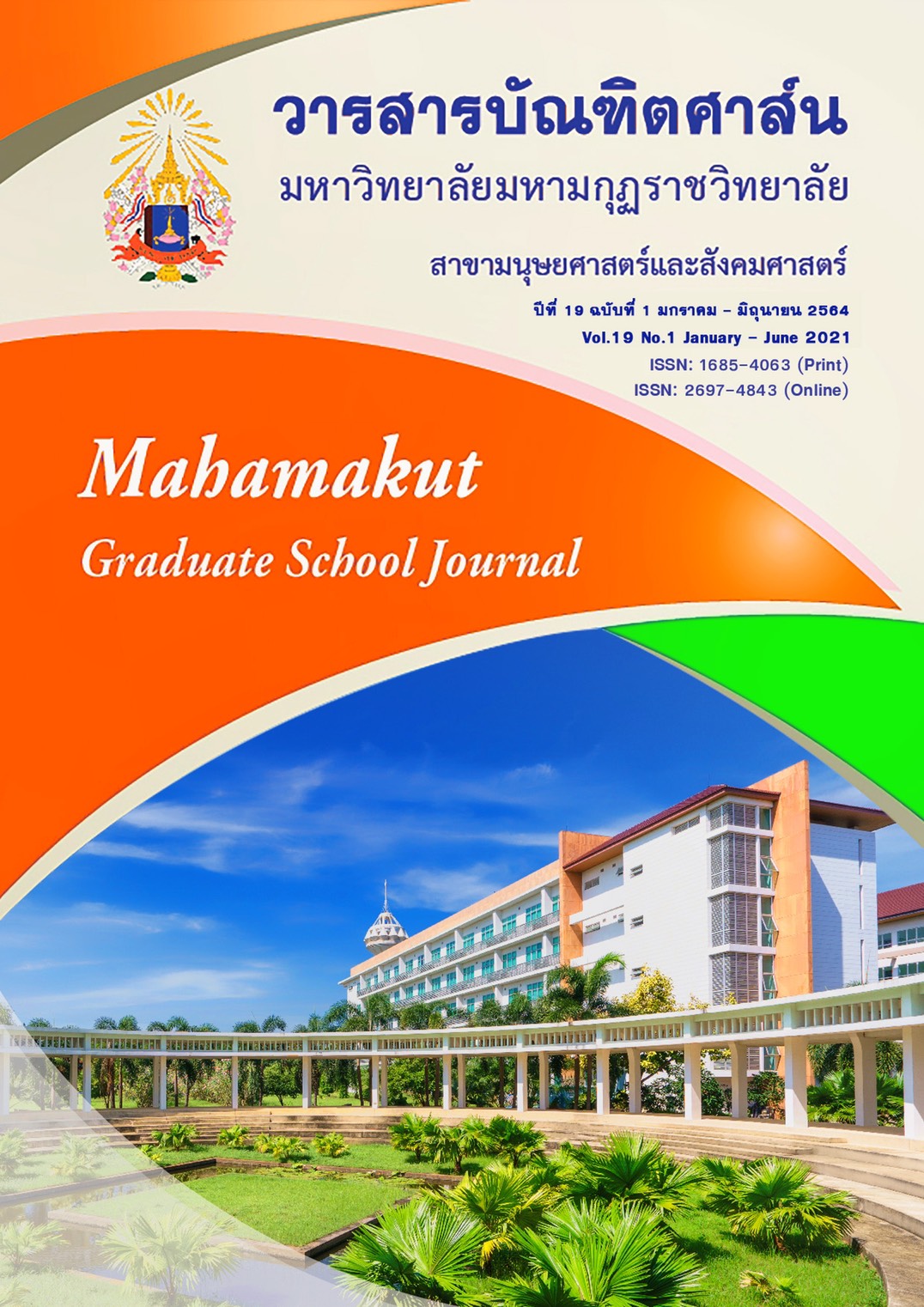ภาวะผู้นำการเปลี่ยนแปลงตามหลักอิทธิบาท 4 ของผู้บริหารที่ส่งผลต่อองค์การแห่งการเรียนรู้ในโรงเรียนกลุ่มกรุงธนใต้ สังกัดกรุงเทพมหานคร
คำสำคัญ:
ภาวะผู้นำการเปลี่ยนแปลงตามหลักอิทธิบาท4, การเป็นองค์การแห่งการเรียนรู้, โรงเรียนในกลุ่ม กรุงธนใต้ สังกัดกรุงเทพมหานครบทคัดย่อ
การวิจัยครั้งนี้ เป็นการวิจัยเชิงพยากรณ์ (Predictive Research) มีวัตถุประสงค์เพื่อ 1) ศึกษาภาวะผู้นำการเปลี่ยนแปลงตามหลักอิทธิบาท 4 ของผู้บริหาร 2) ศึกษาการเป็นองค์การแห่งการเรียนรู้ในโรงเรียนกลุ่มกรุงธนใต้ 3) เพื่อศึกษาภาวะผู้นำการเปลี่ยนแปลงตามหลักอิทธิบาท 4 ของผู้บริหารที่ส่งผลต่อองค์การแห่งการเรียนรู้ในโรงเรียนกลุ่มกรุงธนใต้ สังกัดกรุงเทพมหานคร ขนาดกลุ่มตัวอย่างจำนวน 59 โรงเรียนโดยวิธีการสุ่มตัวอย่างแบบแบ่งชั้น (Stratified Random Sampling) และสุ่มอย่างง่าย ผู้บริหารและครูเป็นผู้ให้ข้อมูล จำนวน 354 คน เครื่องมือที่ใช้เป็นแบบสอบถามเกี่ยวกับภาวะผู้นำการเปลี่ยนแปลงตามหลักอิทธิบาท 4 ของผู้บริหารกับองค์การแห่งการเรียนรู้ในโรงเรียนกลุ่มกรุงธนใต้ สังกัดกรุงเทพมหานคร วิเคราะห์หาค่าความเที่ยง (Reliability) โดยภาพรวม เท่ากับ .981 สถิติที่ใช้ในการวิเคราะห์ข้อมูล ได้แก่ ค่าความถี่ ค่าร้อยละ ค่าเฉลี่ย ค่าส่วนเบี่ยงเบนมาตรฐาน และการวิเคราะห์ถดถอยพหุคูณแบบขั้นตอน โดยใช้โปรแกรมสำเร็จรูป ผลการวิจัย พบว่า 1) ภาวะผู้นำการเปลี่ยนแปลงตามหลักอิทธิบาทของผู้บริหารสถานศึกษาในโรงเรียนกลุ่มกรุงธนใต้ สังกัดกรุงเทพมหานคร โดยภาพรวมทั้ง 4 ด้าน อยู่ในระดับมากที่สุด เมื่อพิจารณาค่าเฉลี่ยเป็นรายด้าน อยู่ในระดับมากที่สุดทุกด้าน โดยเรียงลำดับตามค่าเฉลี่ยจากสูงสุดไปต่ำสุด คือ ด้านการมีอิทธิพลอย่างมีอุดมการณ์ตามหลัก อิทธิบาท รองลงมาด้านการคำนึงถึงความเป็นปัจเจกบุคคลตามหลักอิทธิบาท ,ด้านการสร้างแรงบันดาลใจตามหลักอิทธิบาท และด้านการกระตุ้นทางปัญญาตามหลักอิทธิบาท ตามลำดับ 2) การเป็นองค์การแห่งการเรียนรู้ในโรงเรียนกลุ่มกรุงธนใต้ สังกัดกรุงเทพมหานคร มีคะแนนค่าเฉลี่ยโดยรวม อยู่ในระดับมากที่สุด โดยเรียงลำดับตามค่าเฉลี่ย จากสูงสุดไปต่ำสุด คือ ด้านความเชี่ยวชาญส่วนบุคคล, ด้านการสร้างและสานวิสัยทัศน์ร่วมกัน, ด้านการเรียนรู้ร่วมกันเป็นทีม, ด้านการคิดเชิงระบบและด้านการมีแบบแผนทางความคิดตามลำดับ 3) ภาวะผู้นำการเปลี่ยนแปลง ตามหลักอิทธิบาทของผู้บริหารสถานศึกษาส่งผลต่อองค์การแห่งการเรียนรู้ในโรงเรียน กลุ่มกรุงธนใต้ สังกัดกรุงเทพมหานคร อย่างมีนัยสำคัญทางสถิติ ที่ระดับ .01 เรียงลำดับความสำคัญ คือด้านการคำนึงถึงความเป็นปัจเจกบุคคล (x4) ด้านการกระตุ้นทางปัญญา (X3)และด้านการสร้างแรงบันดาลใจ (X2)โดยมีค่าสัมประสิทธิ์พยากรณ์ทำนายของการเป็นองค์การแห่งการเรียนรู้ ในโรงเรียนกลุ่มกรุงธนใต้ สังกัดกรุงเทพมหานคร ได้ร้อยละ 61.8 ( R2 = .618) สามารถเขียนเป็นรูปสมการวิเคราะห์การถดถอยได้ดังนี้
สมการคะแนนดิบ y ̂ =.740+.460 (x 4) +.217 (x3) + .148 (x2) (R2 = .618)
สมการคะแนนมาตรฐาน Z ̂ Y= .454 (x 4) + .231 (x3) + .156(x2) (R2=.618)
เอกสารอ้างอิง
Krejci, R. V., & Morgan, D. W. (1970). Determining sample size for research activities. Educational and Psychological Measurement, 30(3), 607-608.
Maslow, A. H. (1943). A Theory of Human Motivation. Psychological Review.
Moilanen. R. (2001)“Diagnostic tools for learning organizations,” The Learning Organization. 8 (1): 6 - 20.
William L. Koh Richard M. Steers James R. Terborg. (1995) The effects of transformational leadership on teacher attitudes and student performance in Singapore. Journal of Organizational Behavior. 16, (4), 319-333.
Senge, M. P. (1990). The Fifth Discipline: The Art & Practice of the Learning Organization. New York: Doubleday.
จันทรัศม์ ภูติอริยวัฒน์. (2560). ภาวะผู้นำการเปลี่ยนแปลงของผู้บริหารสถานศึกษากับแรงจูงใจใน การทำงานของครูที่ส่งผลต่อจิตวิญญาณความเป็นครูโรงเรียนสังกัดสำนักงานเขตพื้นที่ การศึกษามัธยม กรุงเทพมหานครเขต 2. วารสารศึกษาศาสตรมหาวิทยาลัยศิลปากร. 10 (3), 1738-1739.
จันทนา อุดมและหะริน สัจเดย์. (2561). กรอบแนวคิดการพัฒนายุทธศาสตร์องค์กรแห่งการเรียนรู้ ของสถาบันอุดมศึกษาไทยเพื่อการขับเคลื่อนสู่สังคมความรู้.วารสารสันติศึกษาปริทรรศน์ มจร, 6(1), 353.
จรูญวิชญ์ ผลสุวรรณ, ผศ. ดร. ชญาพิมพ์ อุสาโห. (2559). การศึกษาความเป็นองค์กรแห่งการเรียนรู้ของ รงเรียนสันติราษฎร์วิทยาลัย กรุงเทพมหานคร. วารสารอิเล็กทรอนิกส์ทางการศึกษา. 10 (3), 429- 437 สืบค้นเมื่อ 2 มีนาคม 2562, จาก https://bit.ly/3aClVGO.
ชาตรี วงค์สายสิน. (2561). รูปแบบการพัฒนาองค์การแห่งการเรียนรู้ของสถานศึกษาขนาดใหญ่ สังกัดสำนักงานคณะกรรมการการศึกษาขั้นพื้นฐาน. วารสารมหาจุฬาวิชาการ 5 (1) 91.
นุช สัทธาฉัตรมงคล. (2559). ผู้นำการเปลี่ยนแปลงในยุคโลกาภิวัตน์สู่การพัฒนาอย่างยั่งยืน. วารสาร ธุรกิจปริทัศน์. 8 (1), 167.
นุชนาถ มีสมพืชน์. (2561). ลักษณะความเป็นองค์การแห่งการเรียนรู้ของมหาวิทยาลัยราชภัฏจันทรเกษม. วารสารวิจัยและพัฒนามหาวิทยาลัยราชภัฏเลย. 13 (46) 24.
พระไตรปิฎก เล่มที่ 35 พระอภิธรรมปิฎก เล่มที่ 2 วิภังคปกรณ์ ในหัวข้อที่ 507.
พิมพ์อร สดเอี่ยม. (2557). สถิติสำหรับการวิจัยทางการบริหารการศึกษา. เอกสารประกอบการสอน ภาควิชาการบริหารการศึกษาวิทยาเขตศรีล้านช้าง, มหาวิทยาลัยมหามกุฎราชวิทยาลัย.
พระสิฏฐชวิชญ์ สุปฏิปนฺโน. (2561). ภาวะผู้นำการเปลี่ยนแปลงของผู้บริหารสถานศึกษาที่ส่งผลต่อ องค์การแห่งการเรียนรู้ของสถานศึกษา สังกัดสำนักงานเขตพื้นที่การศึกษาประถมศึกษา นครปฐม เขต 2. วารสารบัณฑิตศาส์น มหาวิทยาลัยมหามกุฎราชวิทยาลัย, 16 (2), 29-39.
ลัดดาวัลย์ เพชรโรจน์และคณะ. (2555). สถิติสำหรับการวิจัยและเทคนิคการใช้ SPSS. พิมพ์ครั้งที่ 2 กรุงเทพมหานคร: เจริญดีมั่นคงการพิมพ์.
เสาวภาคณ์ เชาวนะสิริยธรรม. (2560). การพัฒนาสู่องค์กรแห่งการเรียนรู้ของวิทยาลัยชุมชนเมือง กรุงเทพมหานคร วิทยาลัยพัฒนาชุมชนเมือง มหาวิทยาลัยนวมินทราธิราช. วารสารการจัดการ สมัยใหม่, 15 (2), 57-60.
สำนักการศึกษา กรุงเทพมหานคร. (2561). รายงานการประเมินตนเอง ของสถานศึกษาสังกัด กรุงเทพมหานคร ปีการศึกษา 2559. โรงพิมพ์มหาจุฬาลงกรณ์ราชวิทยาลัย : สำนักงาน ยุทธศาสตร์การศึกษา สำนักการศึกษา. หน้า, 75.
ดาวน์โหลด
เผยแพร่แล้ว
รูปแบบการอ้างอิง
ฉบับ
ประเภทบทความ
สัญญาอนุญาต
ลิขสิทธิ์ (c) 2021 มหาวิทยาลัยมหามกุฏราชวิทยาลัย

อนุญาตภายใต้เงื่อนไข Creative Commons Attribution-NonCommercial-NoDerivatives 4.0 International License.
บทความวิชาการและบทความวิจัยในวารสารฉบับนี้ถือเป็นความรับผิดชอบของผู้เขียนเท่านั้น บทความที่ได้รับการตีพิมพ์ในวารสารบัณฑิตศาส์น ถือเป็นลิขสิทธิ์ของมหาวิทยาลัยมหามกุฏราชวิทยาลัย ตามพระราชบัญญัติลิขสิทธิ์



